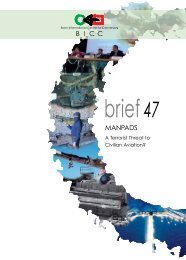egypt-final-presidential-elections-2012
egypt-final-presidential-elections-2012
egypt-final-presidential-elections-2012
Create successful ePaper yourself
Turn your PDF publications into a flip-book with our unique Google optimized e-Paper software.
The Carter Center<br />
Presidential Election in Egypt<br />
Presidential Election Commission<br />
An independent, accountable, and impartial election<br />
management body is recognized internationally<br />
as an important means of ensuring a credible<br />
election. 71 The Constitutional Declaration and the<br />
revised Law Regulating<br />
the Presidential Election<br />
reaffirmed the PEC as<br />
the supervisory authority<br />
for the <strong>presidential</strong> election.<br />
The president of<br />
the SCC is the ex officio<br />
chair of the PEC. The<br />
PEC also consists of four<br />
other senior judges, also<br />
appointed by virtue of<br />
their positions in Egypt’s various courts. 72 The PEC<br />
is supported by the PEC General Secretariat, which<br />
is headed by a secretary-general appointed from a<br />
judicial body. 73 Moreover, the PEC is able to form<br />
committees to monitor specific issues relevant to its<br />
work, such as campaign finance and the media.<br />
It should be noted that a separate electoral<br />
management body, the Supreme Judicial Commission<br />
on Elections (SJCE), oversees parliamentary <strong>elections</strong><br />
and referenda. The rationale for establishment<br />
of separate commissions to organize <strong>presidential</strong> and<br />
parliamentary <strong>elections</strong> is unclear and seems to be<br />
a remnant from the former regime. The temporary<br />
nature of the PEC as an electoral body and its<br />
appointment 74 only shortly in advance to the <strong>presidential</strong><br />
election does not leave much opportunity<br />
to build on any existing institutional knowledge or<br />
to engender trust in this important phase of Egypt’s<br />
democratic transition. 75<br />
The PEC enjoys broad powers, duties, and responsibilities<br />
in all aspects of the <strong>presidential</strong> electoral<br />
process. The PEC is mandated not only to implement<br />
all aspects of candidate nomination and registration<br />
and regulate campaigning but also to supervise the<br />
polling, counting, and tabulation of the electoral<br />
results. Furthermore, it has the prerogative to decide<br />
on matters referred to it by the DGCs, verify and<br />
27<br />
announce the <strong>final</strong> election results, and decide on<br />
complaints and challenges related to the election.<br />
The PEC is able to rely on Egypt’s state agencies<br />
for the implementation of the election, including on<br />
experts seconded to it. 76 One of the state agencies<br />
upon which the PEC<br />
relies is the Ministry<br />
of Interior (MoI). The<br />
MoI still provides necessary<br />
administrative,<br />
An independent, accountable, and<br />
impartial election management body is operational, and logistic<br />
recognized internationally as an important<br />
support to the electoral<br />
process (such as handling<br />
means of ensuring a credible election.<br />
ballot papers, ballot<br />
boxes, indelible ink,<br />
movement of materials,<br />
etc.). The MoI also is mandated to supervise all security<br />
arrangements for the electoral process. 77<br />
At the governorate level, the PEC was supported<br />
by the DGCs. The DGCs are also composed of the<br />
judges, members of judicial bodies and seconded<br />
public employees. 78 The PEC, however, did not establish<br />
a presence in Egypt’s governorates, either through<br />
local branches or through the establishment of DGCs,<br />
until only very shortly before each set of <strong>presidential</strong><br />
71 See for example, AU, African Union Declaration on the Principles<br />
Governing Democratic Elections in Africa, Principle II (4c); International<br />
IDEA, International IDEA International Electoral Standards: Guidelines<br />
for Reviewing the Legal Framework of Elections, p. 37.<br />
72 Article 5 of the Law Regulating Presidential Election determines “the<br />
head of the Cairo Court of Appeal, the most senior deputy head of the<br />
Supreme Constitutional Court, the most senior deputy head of the Court<br />
of Cassation, and the most senior deputy head of the State Council” as<br />
the remaining four members of the PEC.<br />
73 The secretary-general is also the PEC’s rapporteur and the head of the<br />
DGC for OCV and is able to attend deliberative sessions but cannot vote<br />
on decisions.<br />
74 The first official PEC meeting was held on Feb. 18, <strong>2012</strong><br />
75 The Carter Center noted that three members of the Supreme Judicial<br />
Commission on Elections, by the nature of their occupation in Egyptian<br />
courts, were appointed members of the PEC.<br />
76 Article 7, The Law Regulating the Presidential Election<br />
77 In previous <strong>elections</strong>, the MoI had full control over the<br />
implementation of all aspects of the electoral process. However, in <strong>2012</strong>,<br />
registration of candidates and printing of ballot papers were implemented<br />
directly by the PEC.<br />
78 Article 30, Law No. 174 of 2005



